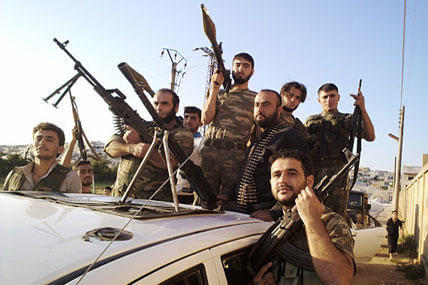The debate between Congress and the White House on arming the Syrian rebels reflected general American reluctance to take a side in a civil war whose death toll will soon surpass the total number of U.S. troops killed in all the nation’s conflicts since World War II.
The potential delivery of U.S. light arms and ammunition, announced by the White House on June 13, was further complicated by fighting between the rebel factions trying to oust Syrian President Bashar al-Assad, whose forces have been on the offensive with support from Russia, Iran and Hezbollah.
The last United Nations report on casualties in Syria at the end of April put the death toll at 93,000, and human rights groups now say that the number killed has passed 100,000. Sen. John McCain , R-Ariz., and other lawmakers in favor of sending heavy weaponry to the rebels and imposing a no-fly zone now routinely use the 100,000 figure.
Through last week, the total of U.S. war deaths since World War II was 101,892, according to Defense Department statistics -- from Korea (36,574), Vietnam (58,220), the Gulf War (383), Iraq (4,475) and the ongoing war in Afghanistan (2,240).
The U.S. had repeatedly rejected Syrian opposition pleas for weaponry, but the White House reversed course last month after the CIA said that “small scale” use of chemical weapons by the Assad regime had been verified.
Small arms and ammunition would now be supplied to “moderates” among the Syrian rebels, but the reluctance of the White House to be seen as a major player in yet another Middle East war was evident in the method of the announcement.
President Obama did not make the announcement, nor did Secretary of State John Kerry or Defense Secretary Chuck Hagel. Instead, it was left to Deputy National Security Adviser Ben Rhodes to explain what was a major policy change for the U.S. in a late-afternoon conference call with reporters, hardly the usual format for such a decision.
“The president has said that the use of chemical weapons would change his calculus, and it has,” Rhodes said.
Four days later, at an economic summit in Northern Ireland, Russian President rejected Obama’s plea to stop supporting Assad.
“Our opinions do not coincide,” Putin said with Obama sitting next to him.
The White House said initially that arms would be funneled to the Supreme Military Council of the Free Syrian Army, led by a Syrian army defector, Gen. Salim Idriss
The U.S. also appeared to be setting up a conduit for the CIA to deliver the arms by leaving behind several hundred troops, F-16 attack aircraft and Patriot missile batteries in Jordan at the conclusion of a recent training exercise. However, Syrian opposition leaders last week said that “not a single bullet” from the Americans has yet arrived.
In a series of press briefings last week, White House Press Secretary Jay Carney said the administration wanted to consult with Congress before delivering arms, although there was nothing in the law under the Foreign Assistance Act barring the U.S. from arming the rebels.
“Well, as I said earlier, in keeping with the president’s announcement of our stepped-up assistance to the Supreme Military Council, we are going to consult with Congress on these matters, and we intend to provide that stepped-up assistance,” Carney said.
When asked for a delivery date on arms, Carney said: “I don’t have any more details on that for you, but we were not bluffing. The president was very serious, as I think he made clear. And I think that -- well, I’ll just say that we’ll continue to consult with Congress on this matter because it’s very important.”
Israel’s apparent growing involvement has added to the volatile mix. Under Tel Aviv’s long-standing policy, Israel has neither confirmed nor denied responsibility for two airstrikes in recent months aimed at arms shipments for Hezbollah.
Prime Minister Benjamin Netanyahu took the same stance Sunday on a reported strike last week against a Syrian navy barracks near the port of Latakia where Yakhont anti-ship missiles bound for Hezbollah allegedly were stored.
On the CBS’ “Face the Nation” program Sunday, Netanyahu said that Israel is blamed “every time something happens in the Middle East,” but he added that Israel was determined to “prevent the transfer of dangerous weapons to Hezbollah,” the Lebanon-based Shia group whose fighters have bolstered the ranks of Assad’s forces.
Since the June 13 U.S. policy change, the rift between the Syrian rebel “moderates” and hard-line factions with links to al-Qaida has widened. American public opinion polls show an increasing wariness of involvement in the civil war, and grisly videos showing savage acts by purported rebels has caused general confusion among the western world about who the “good guys” are in the conflict.
Last week, the Free Syrian Army charged that another rebel faction calling itself the Islamic State of Iraq and Syria had assassinated FSA commander Kamal Hamami. FSA leaders vowed revenge.
According to a Pew Research Center poll earlier this month, about 70 percent of Americans oppose the U.S. and its allies sending arms and military supplies to anti-government groups in Syria.





























